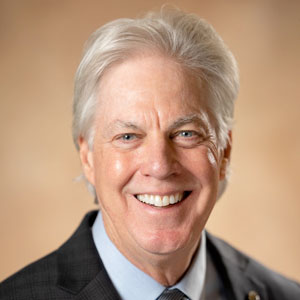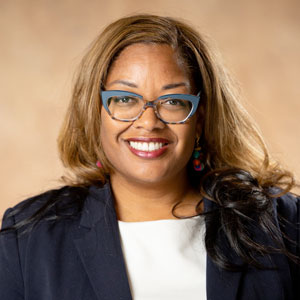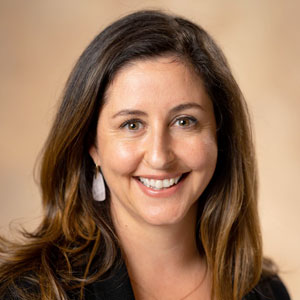
The UNC School of Social Work welcomed all new MSW students to the program on Friday, Aug. 7, with the launch of its annual JumpStart orientation. Unlike in previous years, the kickoff event to the fall semester began with a virtual session, with School leaders greeting students from the safe distance of their living rooms, offices and home offices via webinar.
The JumpStart sessions are designed to introduce students to their new colleagues, faculty and staff; to provide opportunities for meaningful discussions with their peers and with faculty; to help foster a sense of community in the program, and to set the stage for students to develop the necessary knowledge, skills, and understanding of the profession to successfully complete the MSW program.
This year’s online event was the first of many such sessions the School will host in the coming months due to the ongoing COVID-19 pandemic and the decision to continue with remote classes to ensure the safety of students, faculty and staff.
“We’re working together to make your first year at the UNC School of Social Work as optimal as possible,” Dean Gary Bowen reassured the incoming cohorts. “At the end of the day, the Carolina experience is the connections and relationships that you will form during your MSW experience. I hope at the end of this journey that you’ll be able to share a story about your favorite professor, a staff member or classroom experience and talk about the relationships that helped to anchor you and that provided you with a true sense of identity, connection and support.”
All total, 142 new students have enrolled in the MSW program this year or 24% of the total number who applied, said Sharon Holmes Thomas, assistant dean for recruitment, admissions and financial aid. Nearly two dozen students enrolled in May in the School’s Advanced Standing Program, while the remaining number includes:
• 18 students from the 3-year Winston-Salem program
• 27 students from the 3-year Chapel Hill program and
• 74 students from the 2-year Full-time program
In addition, 26% of the incoming class are students of color, and an estimated 27% are from out of state.

“I can think of no better time for you to enter the profession of social work or for those of you already engaged in this work to be seeking advanced knowledge and training,” Thomas said. “Our communities and families need social workers who are committed to advancing equity, transforming systems, and improving lives. We are excited to be a part of your educational and professional journey and to learn from each of you as well.”
JumpStart also offers new students the opportunity to learn about other ways they can practice their profession in the community, including through participation with the N.C. Chapter of the National Association of Social Workers and through the work of student-led groups, including the Social Work Student Organization and Student Health Action Coalition.
This year’s students enter the social work profession during a time of significant tension and change across the country, as society faces down two viruses: COVID-19 and systemic racism.
“The calamity of these viruses is not coincidental, and the way they play out globally and locally highlights the disproportionate burden communities of color experience across every aspect of daily life,” said Lisa de Saxe Zerden, the School’s senior associate dean for MSW education. “Simultaneously, our country is beginning a long overdue reckoning with our role and complacency in perpetuating systemic racism.”
In particular, the pandemic has exposed the numerous inequities within the U.S. health care system and focused further attention on America’s inadequate social safety net – disparities that have long existed and that are also historically tied to racism, Zerden added.
“We see this in who is at risk, who is tested, who is treated, and who dies,” she said. “Many, if not all, of these outcomes are rooted in the social determinants that disproportionately affect people who are already marginalized because of their race or ethnicity, their essential but under-valued employment, lack of insurance, housing, and access to basic services.
“This is not a new chapter of American history, but what is new is your commitment to embark on your MSW degree amidst so much upheaval,” Zerden continued. “You will be working with those who are impacted, whose lives have been fundamentally altered because of this pandemic and the physical, social, economic, and emotional toll it has taken on clients and communities. You are choosing to become professional social workers in a time of national reckoning that requires us all to more consciously work toward dismantling the ugly underbelly of policies, practices, and personal actions that have allowed this to happen.”

Faculty and staff have worked diligently over the past year to strengthen the School’s curriculum and overall program to better prepare students for these challenges, said Travis Albritton, the School’s assistant dean of diversity, equity and inclusion. These efforts have involved adjusting courses to incorporate critical race theory and to center the experiences of people of color, individuals with disabilities and the experiences of those who identify as LGBTQI and as nonbinary, he explained.
“We want to help students to look at policies from a more justice-oriented approach,” Albritton explained. “We want to center marginalized voices, and when we think about centering marginalized voices, we want to think about the harm that marginalized communities have experienced. We also want to talk about the resistance and resilience that exists in so many marginalized communities. My hope is that we will also talk about how we stop poisoning the water so that we don’t have to keep praising people for being resilient while swimming in poisoned water.”
These honest conversations are necessary to create a more diverse, equitable and inclusive environment, including within the School, he added.
“We need to look at our own biases and how our identities impact the work we do,” he said. “My hope is that as we have these conversations that you will become uncomfortable. If you do not become uncomfortable at some point in your journey, then we are not doing what we are supposed to do. Discomfort can be disorienting, difficult, and it can be hard. But I say to you that discomfort is necessary because without it, we can’t begin the all-important task of growing.”

